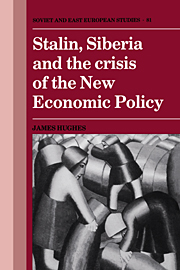Summary
Western approaches to the study of Soviet history in the era of NEP and Stalin's ‘revolution from above’ generally suffer from an over-preoccupation with ‘high politics’ and a tendency to consign provincial areas of the country to the historical margins. Consequently, local influence on policy-making at the centre and local considerations in the implementation of orders ‘from above’ are downplayed and glossed over. This fundamental gap in our understanding of events in this period has been partially overcome by the substantial body of Western scholarly works that have focussed on the Smolensk Archives in the USA, a unique and rich source of local material, while studies of the ‘big city’ party organisations of Moscow and Leningrad remain accessible and popular. Outside of these areas our knowledge of events across most of the country is patchy. In the 1980s the conceptual approach of local studies, assessing the dynamic of history in operation at the grassroots where party and government most impinged upon the vast majority of Soviet citizens, has been applied by some social and economic historians to the years of Stalin's revolution, but so far the NEP era has escaped investigation from this angle.
The deficiency in our knowledge of NEP – the strategic retreat to a gradual transition to socialism imposed by Lenin in 1921, whereby the ‘commanding heights’ of the economy (large-scale industry, banking, transport, foreign trade) remained under state ownership and management, while a regulated market mechanism was established in the economic relationship between the state and the peasantry – is highly unsatisfactory given that it is part of the Western academic conventional wisdom that local factors were of crucial importance in Stalin's decision to abandon NEP in favour of a ‘great turn’ to rapid collectivisation and industrialisation.
- Type
- Chapter
- Information
- Publisher: Cambridge University PressPrint publication year: 1991
- 2
- Cited by



